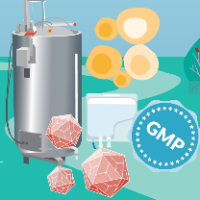Adeno-associated viral vector process development challenges in early research & preclinical study
Cell & Gene Therapy Insights 2022; 8(3), 411–420
DOI: 10.18609/cgti.2022.060
Significant advances have been made in gene therapy using recombinant adeno-associated virus (rAAV) in recent years. Given the interest in and success of rAAV as a novel therapeutic modality, there has been an increase in preclinical proof of concept studies and clinical trials. However, with the momentum and competition in gene therapy, many research groups are coming up with novel AAV variants, new combinations of rAAV constructs, combined with targeted genes of interest to outperform traditional and competitor therapies. Also, screening and generation of rAAV libraries have helped identify novel rAAV serotypes and variants. The preclinical research studies require the production of highly pure rAAV particles with multiple serotypes and different gene of interest, thus creating a major challenge for the production and purification of rAAV. It is worth mentioning that the preclinical phase often overlooks the process development aspect and manufacturability of targeted rAAV and thus undermines the challenges that may arise as the rAAV-based gene therapy program progresses. This article outlines some of the major challenges, quality and quantity requirements, and scalability considerations during process development in the research preclinical phase. The process development and research scale production can be challenging considering volume, serotypes, and ever-changing GOI whilst maintaining the high-speed delivery of vectors. Thus, there is an urgent need to create a platform for the production and purification systems that can generate a high quantity of pure rAAV.
